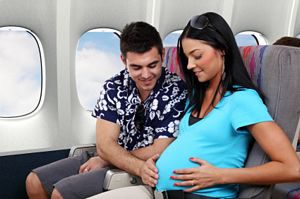
Is it Safe?
Flying during pregnancy is general considered to be safe if you have a healthy pregnancy. The best time to plan for air travel is in the weeks of 14-
Flying in the First Trimester
Flying in an airplane in the first trimester is considered to be safe for pregnant women. It is recommended while on the airplane that you stay hydrated. It is a concern if you suffer from morning sickness that flying may make you feel worse.
This can be treated with eating light or medications prescribed by your doctor. One of the most common side effects of flying in the first trimester is dry sinus cavities and dehydration. A common reaction in a woman in the first trimester is to feel queasy. If you feel this way, you can ask the flight attendant for a sick bag just in case you need to use it. Another thing that you can do is to eat a few crackers or a piece
of fruit.
Flying in the Second Trimester
Flying in the second trimester is considered to be the safest time for air travel. The reason is this is the time that the risk of miscarriage and premature birth is the lowest. It is safe as long as the pregnant woman follows the safety guidelines. It is important when flying to choose your seat carefully, giving yourself plenty of space to move your legs. In order to avoid dehydration, you should drink water frequently. The low humidity in the cabin can cause dehydration.
Flying in the Third Trimester
Flying in the third trimester may not be safe. In fact, generally, airline companies will not allow you to travel after the 36th week of pregnancy. If you are pregnant with multiples or a high-
Radiation
When flying you will be exposed to radiation. The amount of cosmic radiations is very small and has been deemed safe for most women. It is recommended, however; that women limit their air travel while pregnant with limits the radiation the fetus is exposed to. The radiation effect of flying in an airplane is comparable to the radiation felt outdoors. It is very small. The radiation while flying becomes a problem when
you are a frequent flyer.
Airline Rules
FAA
The FAA states that pregnant women after the week of 36th should not fly. The risk of delivering is too great for the FAA to grant it a safe practice. FAA also stated that if you have a history of high-
Delta Airlines
Delta Airlines have not implemented any restrictions for pregnant travelers. Pregnant women before traveling are advised to consult their private physicians to ensure it is safe for their pregnancy.
Southwest Airlines
Southwest Airlines have no restrictions, but do express guidelines. The airline strongly suggests no travel after the 39th week of pregnancy. The airline crew may require a pregnant woman to sit in the emergency row, so they are easily accessible if needing treatment.
United Airlines
United airlines does have restrictions in place. United airlines has no restrictions in the first eight months of pregnancy. The last month of pregnancy, the airline requires a doctor’s note signed within 72 hours from the time during the flight indicating your due date, departure time and dates, and a statement that the travel in a plane will not hurt your or baby’s health. The company depends on the honor policy for
the travelers to be honest in regard to the weeks of pregnancy. The same restrictions apply to domestic or international travelers.
American Airlines
American Airlines have restrictions. The company will allow normal travel for all
pregnant women until the last month of pregnancy. In the last month of pregnancy,
the airline will require you to provide a doctor’s letter indicating the safety of
flying. If traveling within the last seven days of the delivery date domestically,
in addition to a doctor’s letter, you will need to have clearance by an American
Airlines special-
days of pregnancy, you will need to provide a doctor’s letter guaranteeing the safety
of travel in addition to the clearance from the American Airlines special-
coordinator.
